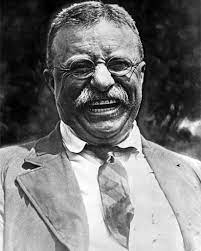It was Teddy Roosevelt of all people who first pointed out that comparison is the thief of joy. Henry VIII didn’t get that memo, having joined five of his six wives in the great beyond some hundreds of years before the Bull Moose Party.
I didn’t knew Henry personally, but he impresses me as a grouchy sort, starting wars against countries with which Britain was aligned, beheading wives, that sort of thing. Why was the ruler of pretty much everything with castles all over the place and a bunch of servants such a grumpus?
Give a kid a hammer and everything looks like a nail. I’ve spent my adult life thinking about and counseling families, so I tend to evaluate everything in terms of relationships. Could Henry have been a grouch because he didn’t get along with anybody? Or, and this is where I come down on the issue, because all his kids kept dying.
Hard to know exactly how many kids Henry lost. Five that history easily accounts for, but with Henry uncommitted to connubial monogamy, there could be as many other “illegitimate” kids who also died. His first wife, Catherine, gave birth to a stillborn child soon after she and Henry were married. Her next child died before his first birthday. Two more pregnancies resulted in two more still born children.
Which brings me back to comparison being the thief of joy. Could Henry have been jealous of “commoners” whose children survived long enough to get their cart driver’s licenses? Could he have been envious of other monarchs whose children grew up to succeed them. Henry was certainly crotchety enough to divorce or murder a wife who didn’t have the good sense to give him a male child. (In addition to not sitting next to Teddy Roosevelt in philosophy class, Henry also apparently missed Intro to Bio where he would have learned that the male contribution determines the gender of the embryo.) Did Henry, who had enough food at a given meal to feed a small country, feel jealous of folks who had more healthy children than calories. Was Henry’s joy—he certainly had the 16th century equivalent of Jacuzzis and Jaguars—stolen by comparing himself to successful fathers.
Fast forward to “modern” times in which I chatted with a dad the other day who was about as peevish as anybody could be at a holiday party with homemade cookies and colorful sweaters. This dad pointed out how high his taxes were, how he didn’t know where all that money went, how “other” people were profiting from his hard work. He was also angry about the quality of his health care, complaining about how long he had to wait for an appointment with his primary care physician, how a $40 copay seemed unreasonable. Those doctors got all kinds of money and they don’t even know which end of a hammer to use, he complained.
Nobody pointed out—it was a family get together after all—that his three children attended public school, that the roads in his neighborhood were paved and safe, that he could well afford forty bucks for life-saving medications, and that Henry VIII would have given half his kingdom, never mind a pair of 20 dollar bills, for the antibiotics that could have saved the lives of his children. (Four hundred something years later, President Roosevelt lost his first wife and his mother on the same day. These tragic losses would have easily been prevented by modern medicine.)
Comparison is the thief of joy. My relative is seething that somebody somewhere has a twenty dollars copay instead of a forty dollar one and is waiting ten minutes instead of an hour to see a doctor. He impressed me as a dissatisfied, unsettled man. As I am interested in how to bring up contented children in this difficult world, I would suggest that you, their parents, emphasize what you have—healthy kids—rather than what you don’t—more sushi.
Specifically, infant mortality in Henry’s time was about 14%. Dysentery, scarlet fever, whooping cough, influenza, smallpox, and pneumonia killed 30% of children before age 15. In modern day America, infant mortality is well under one percent. (Could we do even better? Sure. Should we do better? Absolutely. But we’re talking about the likelihood that your child has a horrible outcome in the delivery room or in the first year of life, not how our country stacks up again others.)
You might go so far as to encourage your children to ignore what “everyone” else is doing, eating, wearing, and to be as content as possible with the alleged imperfections in your home.
Of course if you don’t agree that comparison is the thief of joy, then go ahead and compare yourself to Henry VIII. As far as being able to bring up healthy children in these difficult times, I hope you’ll agree that you have a lot for which to be grateful, that you’re doing pretty well, and that the coming year is going to be even better as you get to spend more time with your beloved, healthy, wonderful children.







One thought on “Teddy and Henry”
I have a handout for students on how to be successful. The final entry is: Happiness isn’t having want you want. Happiness comes from wanting what you have.
NB These is evidence that Henry’s personality changed after he took a hard fall in a joust and suffered a traumatic brain injury.Modern medicine might have saved the two wives who were beheaded by treating the TBI.
Love the article! Keep them coming.